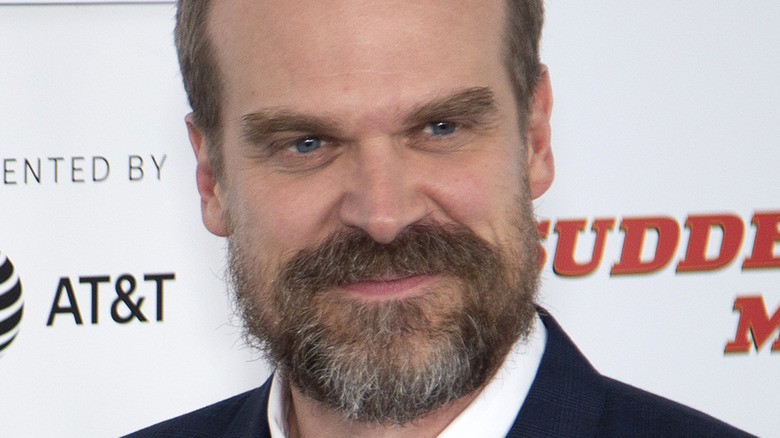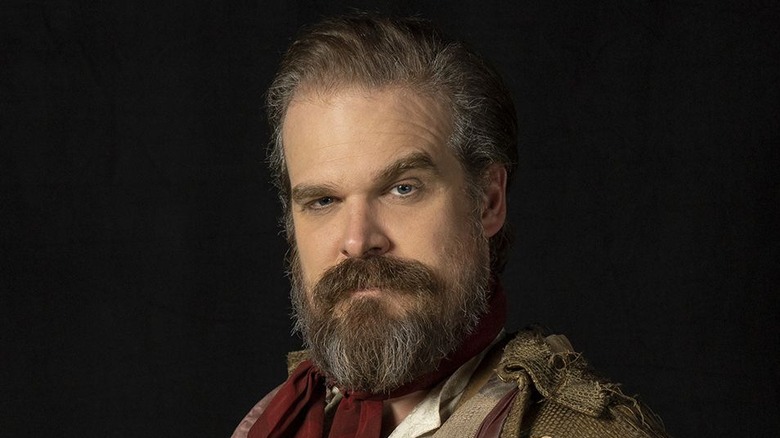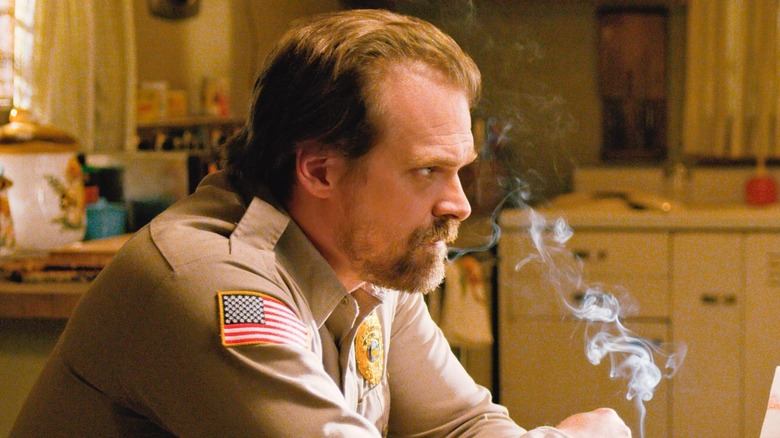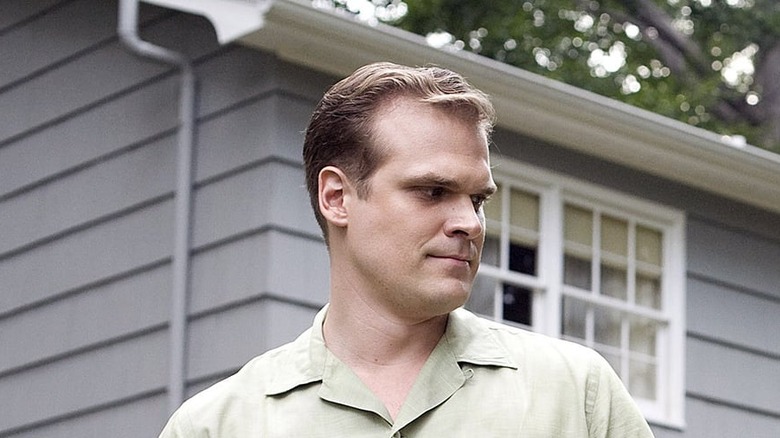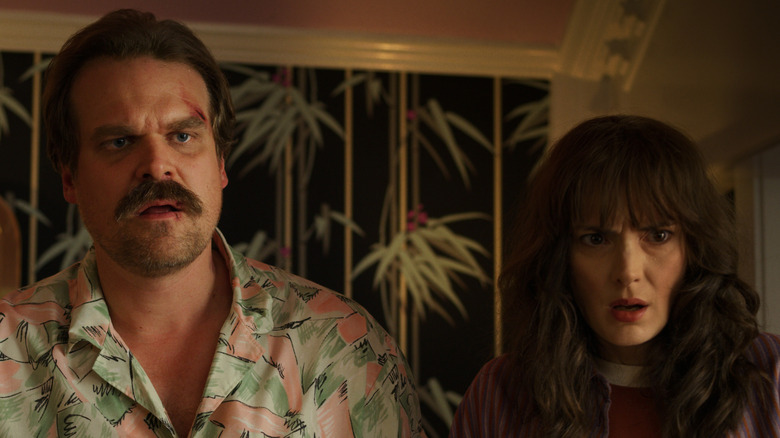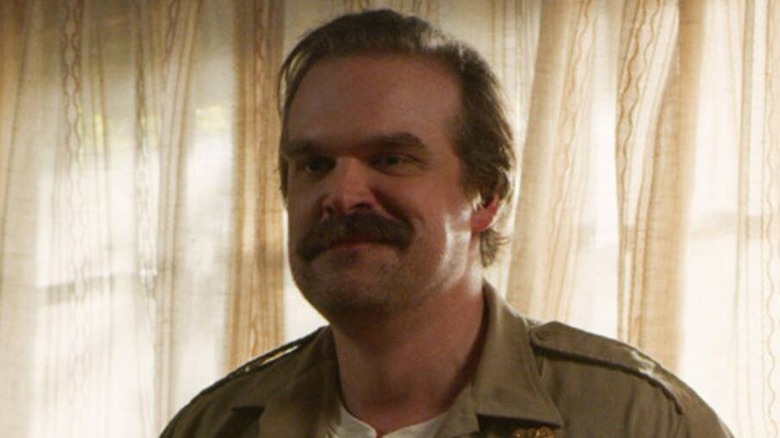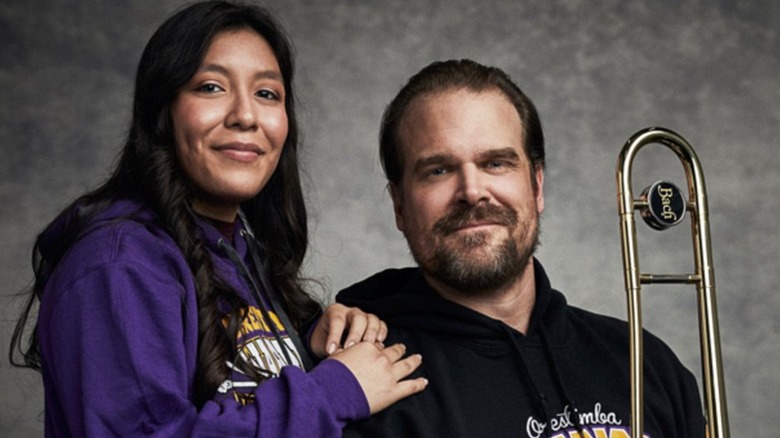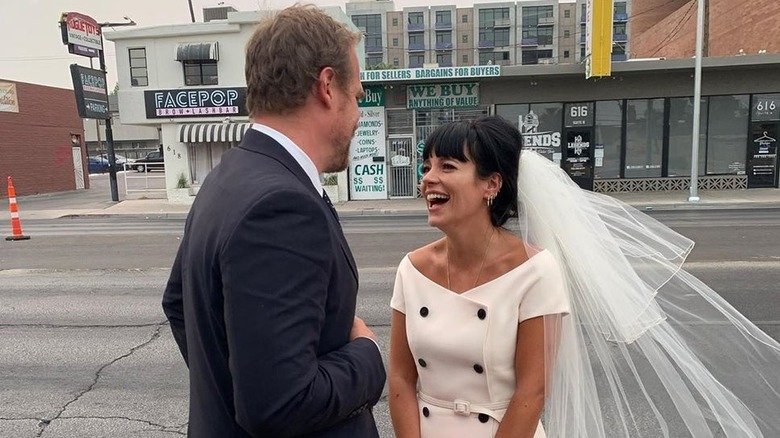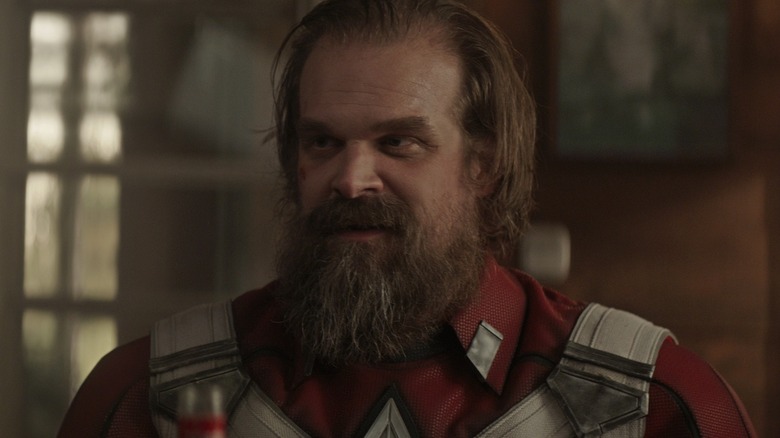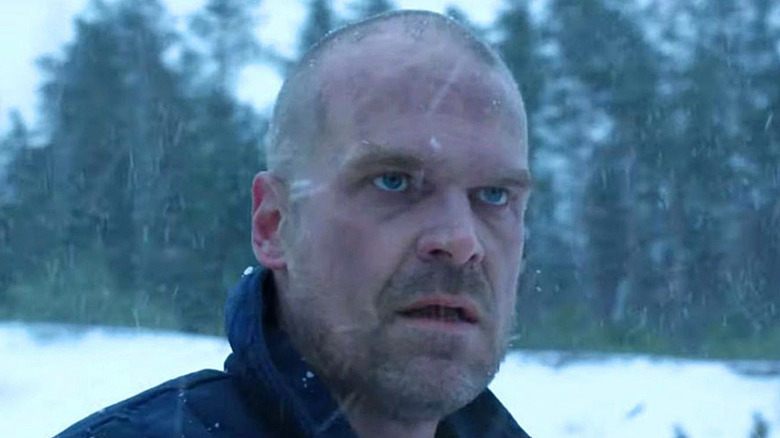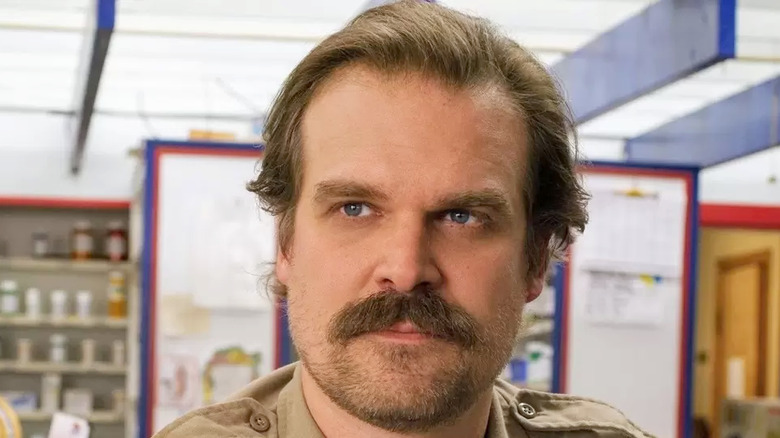The Untold Truth Of David Harbour
David Harbour has been in the acting business for more than two decades. In his early days, Harbour was wholeheartedly committed to the theater, and he made his Broadway debut in 1999 with a role in "The Rainmaker." Since then he's been in countless stage productions, television shows, and movies.
Harbour wasn't a mainstream success until starring as Jim Hopper in Netflix's "Stranger Things," but since the show premiered, his career has been busier than ever. These days, Harbour's work ranges from surreal films like "Frankenstein's Monster's Monster, Frankenstein" to massive blockbusters like Marvel's "Black Widow."
When he's not on the stage or in front of the camera, Harbour can be found spending time with his family, interacting with his fans, and dancing with penguins to help Greenpeace save the Antarctic. He tries to keep his family life private, but he talks openly about his struggles with addiction when he was younger and his experience of living with mental illness. Harbour demonstrates for his fans that anyone can overcome the hardest parts of their life, and that it's possible to be a force for good in the world by doing good for others. David Harbour is at the apex of his career, and this is his untold truth.
He has a love for theater acting
When David Harbour first began acting, he fell in love with the theater, so he moved to New York City to try to make it big on the Broadway scene. Harbour told Sam Jones on Off Camera that he "was a big failure early on," but continued pursuing his ambitions despite the difficulty. In 1999, when Harbour was 24 years old, he made it to Broadway with a role in "The Rainmaker," which led him to being cast in "The Invention of Love." Though his theater career was heating up, Harbour was still getting small roles that didn't quite pay the bills. To make ends meet, he turned to television shows and Hollywood.
Harbour picked up whatever roles he could in shows like "Law and Order" and its spin-offs. He told Esquire, "It paid my rent in New York for months at a time when off-Broadway salaries certainly would not." Harbour referred to his television gigs as "the Dick Wolf subsidy for the theater arts." Though he began spending more of his time on the West Coast, Harbour still acted in a number of plays and had a penchant for Shakespeare. He played Laertes in "Hamlet" and Bassanio in a Broadway production of "The Merchant of Venice."
David Harbour has overcome addiction
David Harbour has been open about his struggles with addiction when he was younger. He told Esquire about drinking heavily throughout his early 20s, saying, "I was the life of the party. Then I wasn't." His behavior and life began to worsen because of his drinking, until it reached a point where Harbour felt like things were out of control.
Harbour spoke on Off Camera about his decision to get sober. "I lost everything," Harbour said, explaining how his drinking had cost him friendships, a love life, and very nearly a place to live. Harbour considered taking his own life, but, as strange as it seems, his concern for his pet cat kept him from going through with it. Instead, he called a friend who had been sober for years and began the long path back to recovery. He talked about the meanness of the people he knew in the "drinking world" and how good it felt to have people be nice to him in recovery. He also admitted to being an "awful human being" while drinking, and how sobriety gave him a chance to repair his relationships. Harbour was 24 when he made the decision to get sober, and he hasn't looked back.
If you or anyone you know is struggling with addiction issues, help is available. Visit the Substance Abuse and Mental Health Services Administration website or contact SAMHSA's National Helpline at 1-800-662-HELP (4357).
He was diagnosed with bipolar disorder
A year after getting sober, David Harbour was diagnosed with bipolar disorder. He first spoke publicly about his diagnosis on Marc Maron's WTF podcast. "I was 25, and I actually did have a manic episode," Harbour told Maron. "I was diagnosed as bipolar." He explained how the diagnosis led to him being institutionalized, and though he'd always romanticized the idea of a mental asylum, in reality, "it just ends up being sad and smells like s***."
With the help of his parents, Harbour checked himself into a voluntary commitment facility. He told Esquire, "The joke around voluntary commitment is that the voluntary part ends when you cross the threshold of the doors." It took about a year for Harbour and his doctors to find the right treatment for him. Harbour told NPR that throughout his life acting has been part of how he's managed his condition. He explained that he still takes medication, and he's found psychoanalysis to greatly benefit his stability, but "to a certain degree, fame has also helped." He went on to explain his belief that society needs to take more responsibility for people's mental health. "I think communities need to be stronger ... our empathy needs to be stronger."
If you or someone you know is struggling with mental health, please contact the Crisis Text Line by texting HOME to 741741, call the National Alliance on Mental Illness helpline at 1-800-950-NAMI (6264), or visit the National Institute of Mental Health website.
Before Stranger Things, he considered leaving Hollywood
David Harbour's life is torn between two coasts. He lives in New York City and spends a good deal of his time acting in plays both on and off Broadway. When he's not on the stage, he's travelling out to the West Coast to film shows and movies, the work that he says really pays the bills. In the years leading up to "Stranger Things," Harbour considered quitting Hollywood altogether and leaving the West Coast part of his life in the dust.
Harbour explained his thought process on NPR's "Fresh Air". "I'd gotten to a place where I only got to a certain level in Hollywood," he said, adding, "So it got to be like a real job because there's not a lot of exploration in those characters." Harbour decided that he would put his energy into his theater work because he enjoyed the feeling of that community much more than the buzzy world of Hollywood. Then the script for "Stranger Things" landed in front of him, and Harbour felt incredibly moved by Jim Hopper's story. He said taking the role has made him "really relish the power of the storytelling of television and film" in a way he hadn't before.
He wanted Hopper to die
"Stranger Things" has transformed David Harbour's life and turned him into a household name. He said in the Los Angeles Times that Jim Hopper is the greatest character he's ever played, and he's even gone so far as calling him, "the greatest character ever written." There's no doubt in the minds of "Stranger Things" fans that Hopper is a key element of what makes the show so enjoyable. Considering Harbour's love for the character, some might be shocked to learn that he had been lobbying for Hopper's death since well before Season 3.
When Hopper is first introduced in "Stranger Things," he's numb to the outside world, having more or less shut himself down after the death of his daughter five years prior. In Harbour's mind, Hopper needed to make a sacrifice to make up for losing his daughter, to shed his skin and become a new man. Though Harbour loves the character, he's committed to the story above all else, and, in his own words, "the whole arc of the whole show for me has been this idea of sacrifice with him." Harbour said he's glad he gets to continue being a part of "Stranger Things," but Hopper's death is still a pivotal moment for the character's story.
He's had a close relationship with his fans via social media
These days, David Harbour won't be found on social media all that often. He's withdrawn from Twitter and Instagram because, as he told The Guardian, they made him feel "like a cog in a greedy tech machine that isn't geared towards beautifying humanity in any sort of way." Before the weight of the tech world fell onto Harbour's shoulders, he used his accounts to try and beautify humanity in his own way. The attempts led to some of the best fan interactions of all time.
In 2017, a Twitter user asked Harbour how many retweets she needed for him to make an appearance in her senior photos. He told her if she hit 25,000, and if she let him wear the school sweatshirt and hold a trombone, he'd be there. When she doubled the goal he set, Harbour geared up and traveled out to Newman, California for a photo shoot.
In 2018, Harbour got ordained as a minister, and went to Springfield, Illinois to officiate a wedding as Jim Hopper after a couple got 125,000 retweets. Harbour told The Guardian he enjoyed "the purity of the play" with his fans online, though he ultimately needed to retreat back into the real world for his own mental health.
He married his wife during quarantine
In the middle of the pandemic, David Harbour found a reason for celebration. He and Lily Allen began dating in 2019, and Harbour moved into Allen's home during quarantine. Allen has two young daughters, and Harbour told The Guardian that he "wanted to be very clear that I love their mother and that I wanted to take care of them and be there for them as a friend and stepfather." With that in mind, he and Allen decided to get married.
The wedding was supposed to be quiet and unpublicized, but social media had to rear its ugly head. Harbour, Allen, and the girls traveled to Las Vegas for the wedding, but after they obtained a marriage license in Clark County, the register office tweeted out the news. "There was once a time where what happened in Vegas stayed in Vegas," Harbour told The Guardian.
Since the news had already been broken to the world, the two of them decided to post some pictures to Instagram. In the caption to his post, Harbour wrote, "In a wedding officiated by the king himself, the people's princess wed her devoted, low born, but kind credit card holder in a beautiful ceremony lit by the ashen skies courtesy of a burning state miles away in the midst of a global pandemic."
He sympathizes with Red Guardian's politics
In "Black Widow," David Harbour plays a Russian superhero called Red Guardian, who is so dedicated to the idea of communism that he has Karl Marx's name tattooed across his knuckles. Harbour leapt at the chance to play the role, not just because he would get to be a part of a major Marvel movie, but also because he has some sympathy for the Red Guardian's political leanings.
Harbour told The Guardian, "I don't know that there's anyone who could disagree with socialist ideology." He said that while he loves the idea of workers having ownership in what their labor is producing, he understands that "the implementation of these things has led to some of the deepest fascism in our society." Because of that, Harbour doesn't take his beliefs quite as far as his character in "Black Widow." His idea of a perfect society is much closer to home and is something almost everyone can recognize. "The idea of a kindergarten-type society where we share things is my ideal society," Harbour said, adding that his ideal society is a better alternative than "this world where we're hunting and killing and destroying for our own personal hoarding, our own personal greed."
He spied on the Black Widow set for Stranger Things
When "Stranger Things" fans last saw Jim Hopper, he was apparently trapped within a Russian prison. As it happens, David Harbour's role in "Black Widow" put him into similar circumstances. At the beginning of the film, Alexei Shostakov (the Red Guardian) needs to be broken out of a Russian jail by Natasha Romanoff (Scarlett Johansson). While filming "Black Widow," Harbour was concerned that his fans would read too much into the similar circumstances of his most famous roles. Harbour told The Guardian, "It is a concern that people will go: 'Woah! It's a crossover!' No guys, it's a coincidence."
What's the best way to avoid avid fans making too many connections? Espionage. On the set of "Black Widow," Harbour would occasionally take pictures and relay information to "Stranger Things" creators/showrunners Matt and Ross Duffer, so they could try to make Hopper's experience as distinct from the Red Guardian's as possible. Harbour explained that even Hopper's look in the upcoming "Stranger Things" season –- his head is shaved, as is his face, and he looks thin — was a purposeful decision to make him look different than Harbour's "Black Widow" character. He also swears the similarities were as surprising to him as they were to his fans, saying, "I promise you, I'm not trying to mold my career, like: 'Please put me in a Russian prison!'"
He wants to help others living with mental illness
As a public figure who's been living with mental illness for most of his life, David Harbour feels a responsibility to raise awareness and find ways to help other people. On "Fresh Air," he said that he started speaking out after "Stranger Things" because he finally had a platform to let people know that they "can be a powerful, strong, successful — even a strong cultural voice in this world" while living with mental illness. Though he first talked about his own bipolar diagnosis on Marc Maron's podcast, he'd originally planned to tell the world at the 2017 SAG awards. He explained, "I had a whole speech prepared for an award ... and I didn't win."
Harbour told Esquire that his planned speech was directed at children diagnosed with mental illness and their parents. He wanted to let them know that a diagnosis was not "a death sentence." He hoped that hearing his story would help people know that they could achieve anything, despite their diagnosis. "Either it gives them hope of achievement or, perhaps even better, makes a bit of a circus of the whole thing and takes the air out of either side of the equation." He continues to talk openly about his experience, and he's still dedicated to helping people see that "we're human. And we're all a mess."
